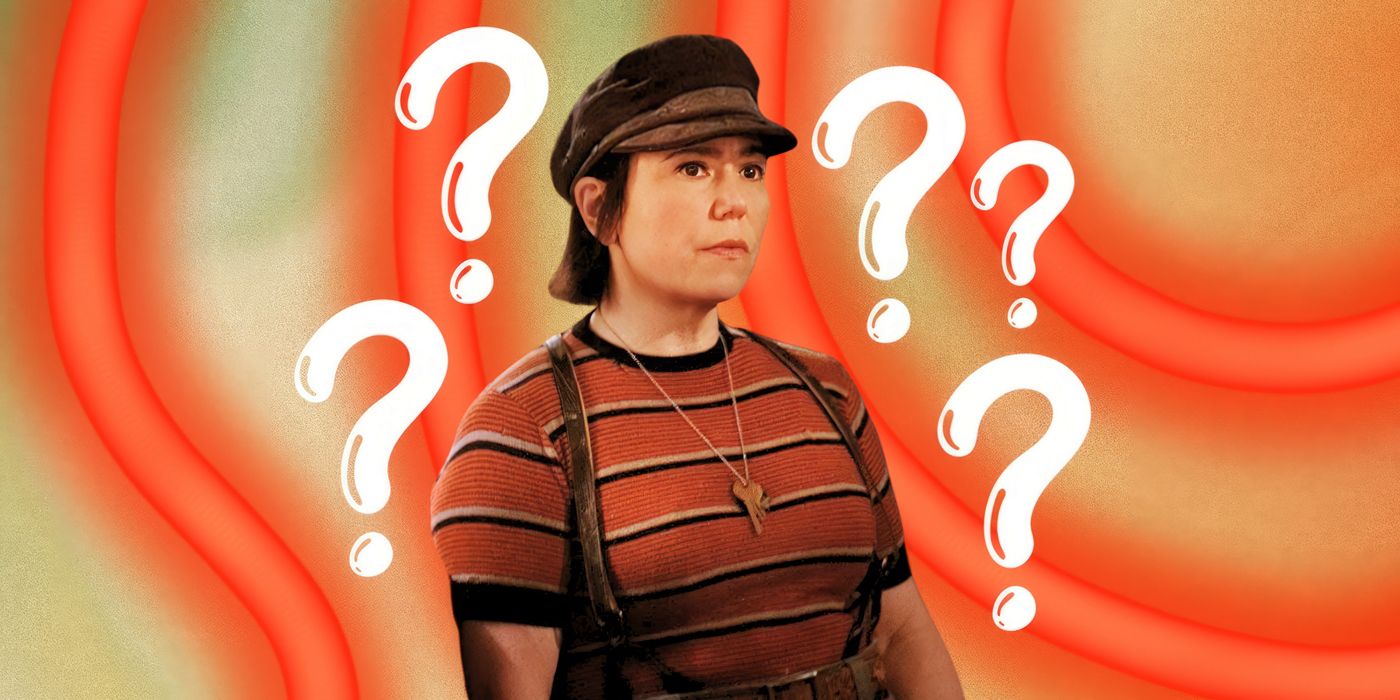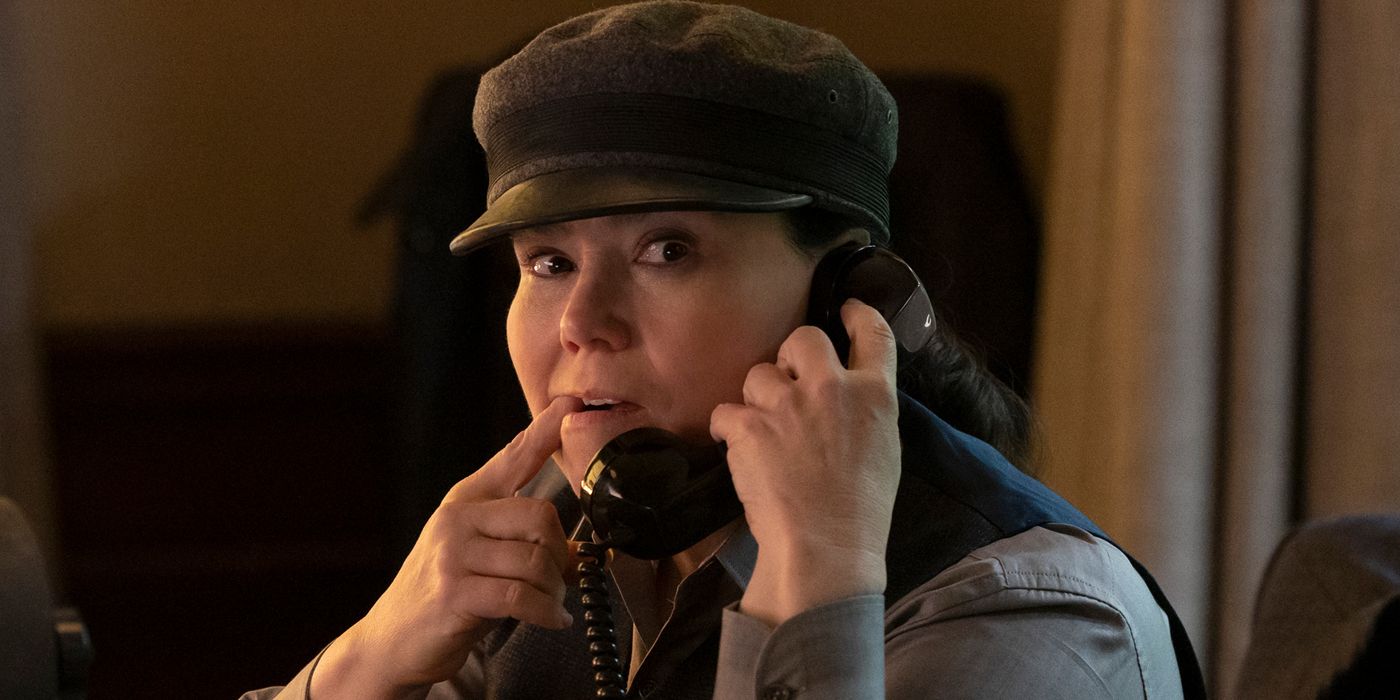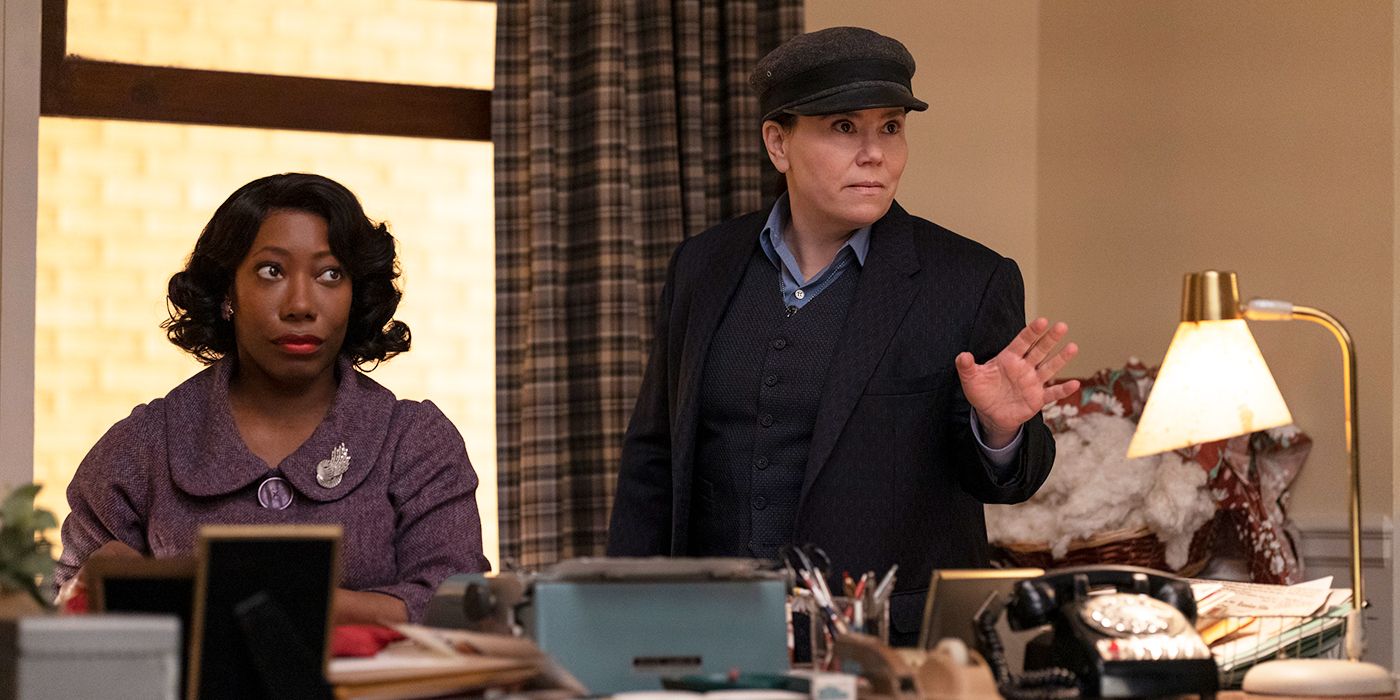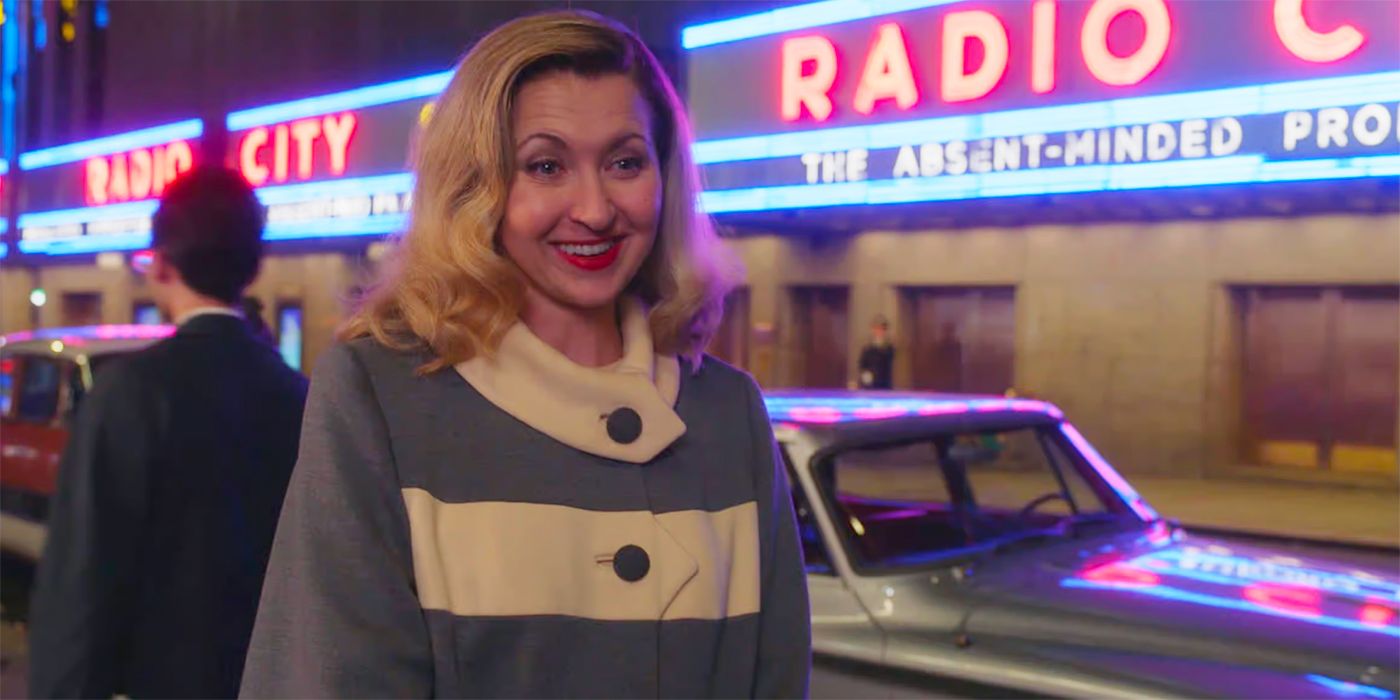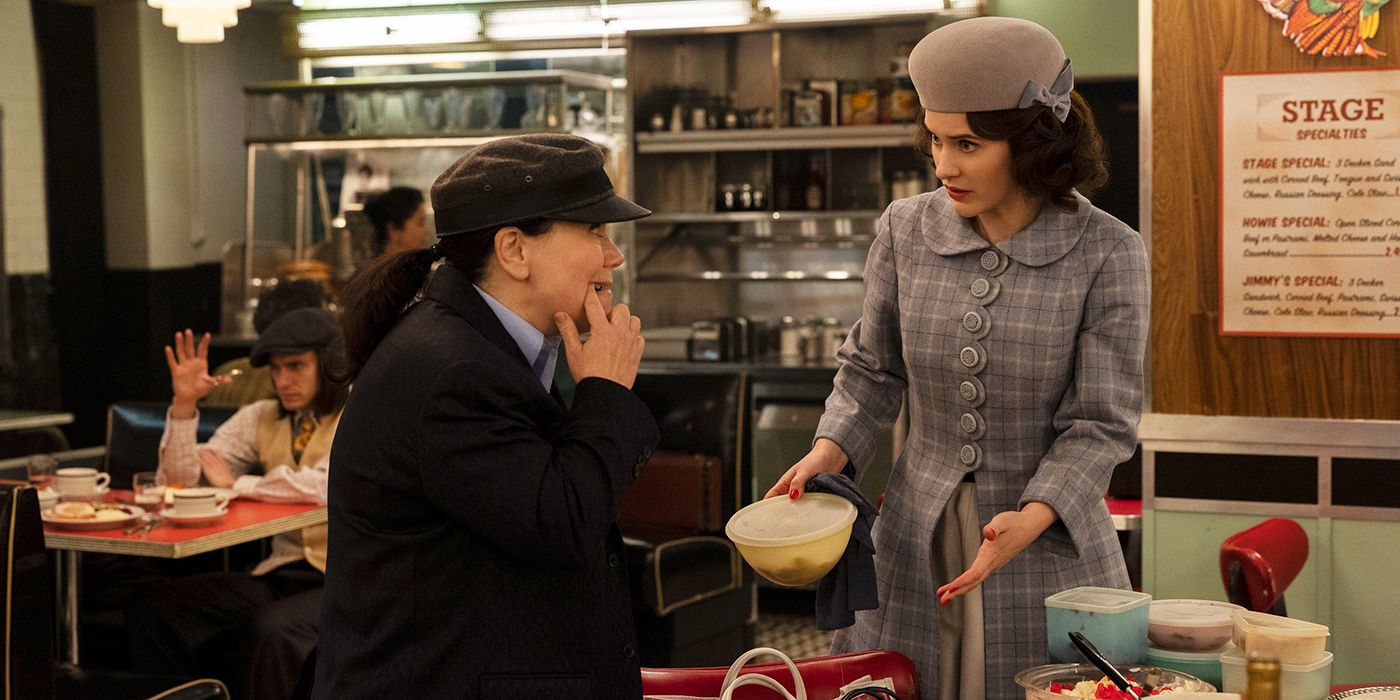Editor's Note: The following contains spoilers for Season 5 Episode 8 of The Marvelous Mrs. Maisel. After years of splitting our sides, it is almost time to say goodbye to the comedic stylings of Miriam ‘Midge’ Maisel (Rachel Brosnahan). On the Prime Video hit, The Marvelous Mrs. Maisel, Brosnahan plays a comedienne that is starting to pick up some serious momentum in her career with the help of her manager, Susie Myerson (Alex Borstein). While it’s Midge’s job to deliver the jokes, Susie is often responsible for a lot of laughs when the two share a scene together. Viewers were quick to embrace her surly attitude and fervid ambition because it is so plain to see that under her tough exterior is someone that cares deeply for the people around her.
These infrequent glimpses into her personal life can excite us as an audience, but it feels as though we’ve been teased with small snippets of vital information over the last 5 seasons. Susie is an integral part of the show and all the relationships within it, at times her secretive nature blurs our understanding of those dynamics. As the show begins to wind down, it is a very real possibility that she may remain a mystery.
The High Stakes For Susie’s Success
Amy Sherman-Palladino and Daniel Palladino are excellent at writing about resilient women. Both Midge and Susie are navigating a career path where the ground is constantly shifting under them. Yet, after every low-paying gig or failed tour, they bounce back, eyes on the horizon. Something that distinguishes their desire for success from one another is what it would mean for them. For Midge, becoming a famous comic means that she’s earned her spot at the top, that she’s talented, despite being written off time and time again. She set out with something to prove, and she can relish in accomplishing that goal. For Susie, it means all that and more. They’re both driven by ambition, but Susie has the added boost of working to ensure her survival.
To say that Susie and Midge come from different worlds is an understatement. While Midge is used to over-stuffed closets in her Upper West Side apartment, the small, Murphy-bed studio with an excellent view of passing pedestrian feet is what Susie and her roommates once called home. Yes, they lead very different lives and had different upbringings. As a result, their priorities are often at odds. Even so, they become the best of friends and hold each other in the highest regard. But it does reframe how each of the women approaches their partnership.
We get to know Susie by meeting her sister, Tessie (Emily Bergl). By incorporating this character, we also learn more about their childhood. Most notably, their mother, who struggled with alcoholism. With just this small piece of information, so much about Susie’s personality and her vices become clearer. Her gambling, for example, circles back to what we now know about her upbringing. She did not grow up privileged like Midge and her relationship with money is very different. Susie makes countless statements, especially while in the Weissman house, that allude to the fact that she has never known a comfortable lifestyle like theirs. Her willingness to problem-solve for other people, like her sister in Season 4, can also be traced back to being raised in an unstable home. She appears reluctant, but Susie is always the one to smooth over the problems that other people create.
Over her many years with Midge, she has done this on countless occasions. Yes, that is part of her job, but Midge becomes almost too reliant on Susie to shelter her from unpleasant encounters. Her willingness to continuously put herself in the line of fire for others is a learned behavior, that we can only properly interpret the more we know about her. Every trait stems from an occurrence in her past that we’ve been piecing together over the last five seasons. Susie’s aloofness may be effective when she’s trying to keep a distance from other people in her life, but it doesn’t have the same impact on her audience. We need to know where she has been and what she has overcome in order to get the full picture of how her flaws led to her achievements.
The Looming Sexuality Question
For years, there has been a call to action for the Palladinos to commit to Susie’s sexual identity. It has been the topic of conversation in many interviews with the creators that typically involve a tactful beating around the bush on their part. While there is some validity in choosing to focus on a character’s goals and dreams as opposed to their sexuality, it seems as if the conversations around her queer identity are deliberately misleading and fans have rightfully labeled it as queer-baiting. In Season 4’s “Interesting People on Christopher Street”, Susie is excited about a new office and expanding her business when Midge takes her to a lesbian bar. Susie’s angry response is incited by Midge’s oversimplified moral high ground of “not caring” if Susie is gay or not, by “being totally comfortable with whatever it is that [Susie] wants to be”.
Midge also oversteps by bringing her somewhere to coax out a piece of Susie’s personal life that she’s not comfortable sharing. She just wants to focus on being a manager. It seems like these two conversations are intentionally woven together so that her sexuality can be justifiably overlooked. Between Midge’s insensitivity and Susie’s excitement, it makes sense that the conversation about Susie’s career takes precedence. Still, this altercation is never again touched upon, and her anger is never explored. Her indignation can also indicate that she’s scared. The comedy club where Susie first discovers Midge, the Gaslight, is a real place in New York City in a “specifically lesbian section of Greenwich Village”. These clubs were prone to police raids, which Susie would know all about because, as she points out to Midge, the Village is her home. So not only is she capable of finding a lesbian bar if she so chose, but she is also able to live her life without Midge’s intervention and permission.
This same tactic is used once again with the introduction of Hedy Ford (Nina Arianda). During a surprise and explosive encounter on the street, Hedy chases Susie down, determined to catch up. Susie is uninterested, and it becomes very clear that there is some unresolved bad blood between the two. Hedy clearly hurt Susie, but we are never given any clear idea about the nature of their former relationship. However, it is heavily insinuated that it was romantic before they had a falling out. Hedy was introduced to us in this short scene and didn’t resurface at all until this week’s installment, “The Princess and the Plea”. Hedy reappears for seemingly no other reason than to coincidentally make Midge’s acquaintance.
Once they get to chatting, she spills the beans that she and Susie are longtime pals. Her role in the episode becomes more about acting as Midge’s meal ticket onto the Gordon Ford Show than about any real insight she can provide into her college years with Susie. Midge begs Susie to talk to Hedy about booking her on the show and Susie retorts with every excuse she can think of. She’ll do anything she can to avoid another awkward run-in. Ultimately, she swallows her pride and approaches Hedy, asking her to speak to her husband on their behalf. Upon seeing her, Hedy seems hopeful that Susie has broken her silence, so they can talk candidly, but Susie quickly shuts her down. Aside from the palpable tension between them, the one inkling of frankness about any past romance comes in the form of a simple but loaded question. Hedy asks if Susie believes in Midge’s talent or “Is it more than that?”. While this is the most direct acknowledgment we’ve seen so far of Susie’s interest in women, as usual, all we can do is infer about Susie’s past.
These scenes set up opportunities for intimacy between Susie and her adoring audience. But they are quickly abandoned presumably for build-up or, as we saw this week, in favor of Midge’s development instead. Frustratingly, the storyline around Susie’s sexuality has been hung out to dry for five seasons. This means that any recognition of the culture that surrounds the Gaslight and the people in it that have been unjustly minimized all this time. By now, this community deserves to be incorporated and appreciated by the story considering how much they have contributed. By taking their time in addressing this side of Susie, the writers have given the impression that her sexuality is treated with the same coy “will they/won’t they” gambit that has also been used to heighten Midge’s relationship with Lenny Bruce (Luke Kirby). Unlike that tantalizing relationship, this aspect of Susie is not a fun game for us to follow breadcrumbs and predict. The act of validating her experience is extremely important to many viewers yearning for this representation.
Susie’s Story Told Through Unreliable Narrators
When we look back at the recent episode, “The Testi-Roastial,” Susie’s sexuality is once again touched upon by the group of industry heavy-hitters that have come together in her honor. One jokes, “Susie Myerson: is she gay, is she straight, who can tell?” as a throwaway line used to implicate that her peers don’t care about her sexuality, so why should we? The structure of this episode is designed to deliver more details of Susie’s life between the 1960s timeframe of the show and the jumps forward to the 1990s. A lot of Susie’s secrets about her personal life and career are revealed but strategically done so in a way that creates an unreliable retelling of these events, through gossip.
Staying true to the enduring mystique shrouding this character, we are never given a first-person account of what happens in these flashbacks to her defining moments. We as an audience are just left to believe in the version we feel most strongly resonates with the Susie we’ve come to know. This approach isn’t surprising because it’s reminiscent of the way the Palladinos have discussed this character over the course of the seasons. When Vanity Fair asked about her sexuality in 2022, Daniel comments, “Stay tuned in. I think for the first few years, we really focused on Susie and her ambitions. We let the character dictate what the audience should know, which is practically nothing,” Amy continues, “We’re waiting for her to tell us. As soon as she spills the beans, we’ll pass it on.” This response demonstrates an infuriating lack of commitment to an attribute of Susie that matters deeply to a lot of people.
A similar answer was given to Rolling Stone as early as 2018, “Susie is a little more mysterious. She’s a woman who basically at some point shut down in her twenties, and even we don’t quite know why”. To which Amy adds, “Susie’s life is never gonna be [to] find a husband, have some kids — that’s just simply not an option”. Interestingly, this conflicts with Borstien’s own idea of her character. She tells Cosmo just two months later, “I just want Susie to get married and have babies. That's all I want for her.” These gaps in Susie’s development reach far beyond her sexual orientation, it detracts from an integral sense of self that is missing from this character because she is not fully realized.
There is a lot about Susie we still don’t know for certain. We have been given small fragments of her family life and upbringing, and we are about to see the resolution of her catastrophic falling out with Midge. Perhaps, we may even get some definite answers about her rocky relationship with Hedy. With only one more episode to go until the series’ final bow, will we further uncover any of Susie’s well-kept secrets

